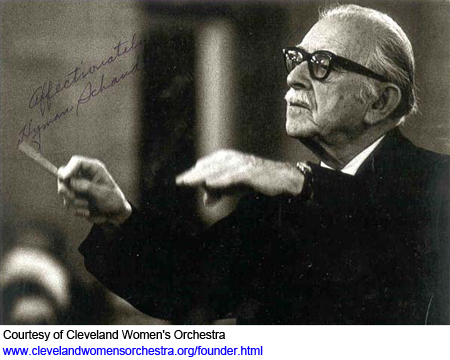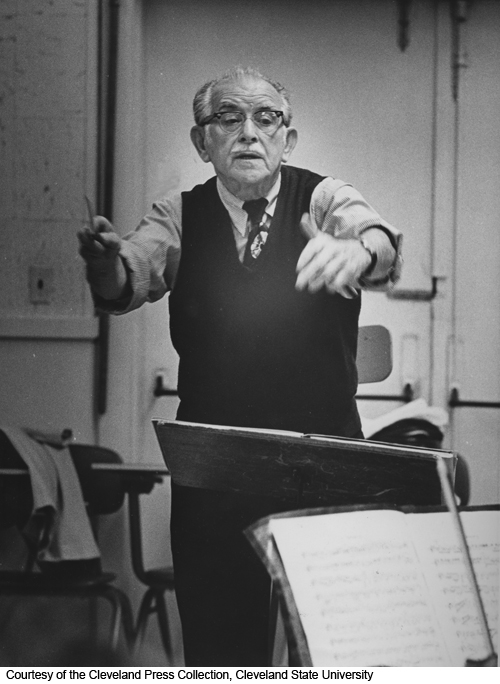Hyman Schandler, Violinist and Conductor, 1900–1990
1984 SPECIAL CITATION FOR DISTINGUISHED SERVICE TO THE ARTS
 In the early decades of the 20th century,
women were not welcome in American symphony orchestras. Managers
considered the rigors of orchestral life too demanding for the fair
sex. Critics questioned their musical abilities. “There is no good
reason why women should not be employed in orchestras,” New York Sun columnist William J. Henderson wrote in 1935. “The question to be asked is whether they can play as well as men.”
In the early decades of the 20th century,
women were not welcome in American symphony orchestras. Managers
considered the rigors of orchestral life too demanding for the fair
sex. Critics questioned their musical abilities. “There is no good
reason why women should not be employed in orchestras,” New York Sun columnist William J. Henderson wrote in 1935. “The question to be asked is whether they can play as well as men.”
Hyman Schandler knew the answer, and it was a resounding “yes!” Having judged numerous high school music competitions, he had found that most of the winners were girls, and he was also aware of the many talented women studying music at Cleveland-area conservatories. To give female musicians of all ages the opportunity to perform symphonic repertoire, he founded the Cleveland Women’s Orchestra in 1935. He initially held rehearsals in a barn-like carriage house where curators from the Cleveland Museum of Natural History kept caged animals. On November 17, 1936, he conducted the ensemble’s debut concert at Severance Hall, the elegant home of the Cleveland Orchestra. Tireless in his commitment to the cause of gender equality in music, he continued to lead the volunteer orchestra for the next 55 years. Prior to the orchestra’s 50th anniversary concert, he estimated that a thousand “girls” (as he affectionately called his players) had participated in the ensemble.
A diminutive man with a twinkle in his eye and the patience of Job, Schandler established high musical standards through a judicious combination of discipline, perseverance, humor and warmth. “He was a marvelous man, a real humanitarian,” said Sabina Berman, a founding member of the orchestra and its principal violist for more than 60 years. “He was like a father, a dear man.” Mrs. Berman, who died on May 9, 2009, at age 93, had also served as treasurer and Mr. Schandler’s “right hand” defacto manager.
 Born
in Riga, Latvia, on August 11, 1900, Schandler emigrated to Cleveland
at age three with his mother and three sisters. His father, a tailor,
had arrived two years earlier. At age nine, the precocious lad started
violin lessons at Bailey’s School of Music, forerunner to the Cleveland
Music School Settlement. During his teens, he began conducting choral
and instrumental groups and teaching violin at the settlement. There,
he met his future wife, pianist Rebecca White. The couple
was married in 1926.
Born
in Riga, Latvia, on August 11, 1900, Schandler emigrated to Cleveland
at age three with his mother and three sisters. His father, a tailor,
had arrived two years earlier. At age nine, the precocious lad started
violin lessons at Bailey’s School of Music, forerunner to the Cleveland
Music School Settlement. During his teens, he began conducting choral
and instrumental groups and teaching violin at the settlement. There,
he met his future wife, pianist Rebecca White. The couple
was married in 1926.
The following year, Schandler won a post with the Cleveland Orchestra. During his 48-year tenure, he played under the direction of the orchestra’s first five music directors. For 37 years, he served as principal second violin. In 1931, he traveled to Salzburg, Austria, to study violin with Theodore Mueller and conducting with Herbert von Karajan. Toward the end of his Cleveland Orchestra career, Schandler moved to the back of the violin section, where he became a mentor to younger colleagues. Following his retirement, he played for two seasons in the Dallas Symphony Orchestra as principal guest conductor, which was then led by 1971 Cleveland Arts Prize winner Louis Lane.
Although Schandler devoted most of his energies to music, he also enjoyed fishing, rock collecting and drawing. His greatest passion, though, was the Cleveland Women’s Orchestra. The last surviving ensemble of its genre, the orchestra continues today as Schandler’s living legacy. Following the beloved maestro’s death on September 3, 1990, Plain Dealer music critic Robert Finn eulogized Schandler as “a perfectionist, forever cajoling and hectoring his non-professional players in the Women’s Orchestra to play better than they knew how—and usually succeeding.”
—Wilma Salisbury,